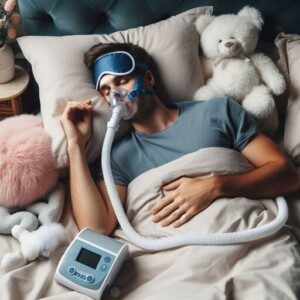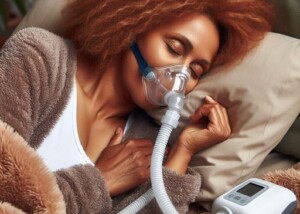
CPAP treatment of sleep apnea lowers cardiovascular risk – significantly, when compared to what it potentially could be if sleep apnea goes untreated on a chronic level.
The following are daytime symptoms of untreated sleep apnea.
• Feeling dog tired despite getting a “full night’s” sleep.
• Frequently feeling drowsy throughout the day.
• Having to take naps but never feeling recharged.
• Easily falling asleep while watching TV, reading or doing computer work.
• Drowsiness when driving.
• Low energy, fatigue.
• Morning headaches.
• Irritability, trouble concentrating.
When the patient begins CPAP treatment, the daytime symptoms may be completely gone after the first treatment.
The patient who’s compliant with CPAP use will often report that they feel refreshed in the morning, alert and perked up throughout the day and have energy they never thought they had.
This new-found energy can motivate the sleep apnea patient to resume an exercise program that had been abandoned due to the symptoms of untreated sleep apnea.
If the patient had never been into exercise, the new-found energy may still be an incentive to take up exercise.
And then from that, any excess body weight may be lost.
As a result, the patient gains improved cardiovascular health and function and lowers their risk of heart attack and stroke.
This is an indirect result from CPAP use.
But what about CPAP leading to a direct effect on cardiovascular risk?
“The reduction of cardiovascular risk via CPAP is an indirect effect of treating the underlying OSA,” says Dr. James Davidson, MBChB, a former internal medicine physician and founder of MedCourse.
“By reducing episodes of recurrent awakening and intermittent hypoxia [shortage of oxygen to the brain], the body has less systemic inflammation, and less reactive oxygen species are formed, reducing the risk of developing atherosclerosis and heart remodeling.”
In heart remodeling, the shape of the heart gets altered from untreated OSA, leading to inefficient pumping.
“There is no evidence, to my knowledge, that CPAP reduces cardiovascular risk in those without OSA, so the effects can be said to be indirect through the improvement of OSA,” says Dr. Davidson.

 Dr. James Davidson trained at the University of Manchester before working for five years as an internal medicine specialist, Northwest of England. He set up several medical education programs and was a communication tutor for medical students. Dr Davidson has an interest in translating complex medical problems into patient-friendly language and founded the medical education startup
Dr. James Davidson trained at the University of Manchester before working for five years as an internal medicine specialist, Northwest of England. He set up several medical education programs and was a communication tutor for medical students. Dr Davidson has an interest in translating complex medical problems into patient-friendly language and founded the medical education startup 








































